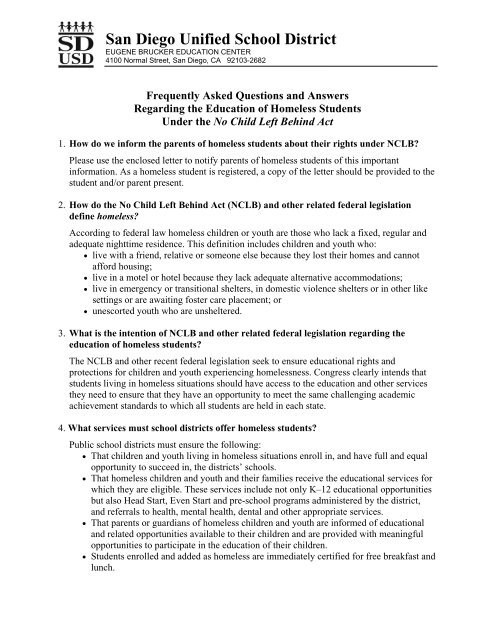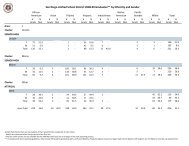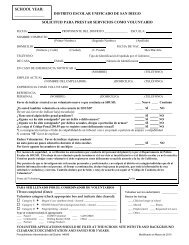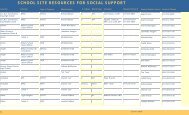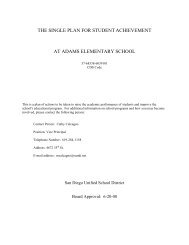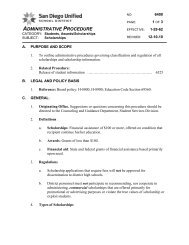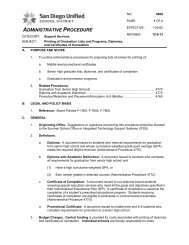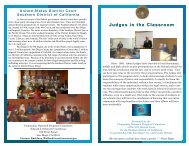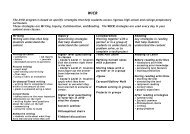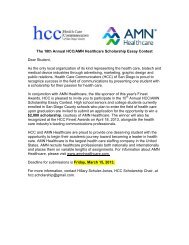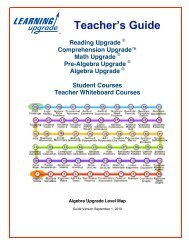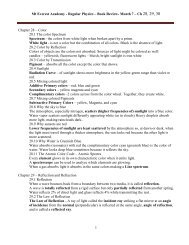frequently asked questions about homeless student education
frequently asked questions about homeless student education
frequently asked questions about homeless student education
You also want an ePaper? Increase the reach of your titles
YUMPU automatically turns print PDFs into web optimized ePapers that Google loves.
San Diego Unified School District<br />
EUGENE BRUCKER EDUCATION CENTER<br />
4100 Normal Street, San Diego, CA 92103-2682<br />
Frequently Asked Questions and Answers<br />
Regarding the Education of Homeless Students<br />
Under the No Child Left Behind Act<br />
1. How do we inform the parents of <strong>homeless</strong> <strong>student</strong>s <strong>about</strong> their rights under NCLB?<br />
Please use the enclosed letter to notify parents of <strong>homeless</strong> <strong>student</strong>s of this important<br />
information. As a <strong>homeless</strong> <strong>student</strong> is registered, a copy of the letter should be provided to the<br />
<strong>student</strong> and/or parent present.<br />
2. How do the No Child Left Behind Act (NCLB) and other related federal legislation<br />
define <strong>homeless</strong>?<br />
According to federal law <strong>homeless</strong> children or youth are those who lack a fixed, regular and<br />
adequate nighttime residence. This definition includes children and youth who:<br />
• live with a friend, relative or someone else because they lost their homes and cannot<br />
afford housing;<br />
• live in a motel or hotel because they lack adequate alternative accommodations;<br />
• live in emergency or transitional shelters, in domestic violence shelters or in other like<br />
settings or are awaiting foster care placement; or<br />
• unescorted youth who are unsheltered.<br />
3. What is the intention of NCLB and other related federal legislation regarding the<br />
<strong>education</strong> of <strong>homeless</strong> <strong>student</strong>s?<br />
The NCLB and other recent federal legislation seek to ensure <strong>education</strong>al rights and<br />
protections for children and youth experiencing <strong>homeless</strong>ness. Congress clearly intends that<br />
<strong>student</strong>s living in <strong>homeless</strong> situations should have access to the <strong>education</strong> and other services<br />
they need to ensure that they have an opportunity to meet the same challenging academic<br />
achievement standards to which all <strong>student</strong>s are held in each state.<br />
4. What services must school districts offer <strong>homeless</strong> <strong>student</strong>s?<br />
Public school districts must ensure the following:<br />
• That children and youth living in <strong>homeless</strong> situations enroll in, and have full and equal<br />
opportunity to succeed in, the districts’ schools.<br />
• That <strong>homeless</strong> children and youth and their families receive the <strong>education</strong>al services for<br />
which they are eligible. These services include not only K–12 <strong>education</strong>al opportunities<br />
but also Head Start, Even Start and pre-school programs administered by the district,<br />
and referrals to health, mental health, dental and other appropriate services.<br />
• That parents or guardians of <strong>homeless</strong> children and youth are informed of <strong>education</strong>al<br />
and related opportunities available to their children and are provided with meaningful<br />
opportunities to participate in the <strong>education</strong> of their children.<br />
• Students enrolled and added as <strong>homeless</strong> are immediately certified for free breakfast and<br />
lunch.
FAQs Regarding Education<br />
of Homeless Students<br />
Page 2 of 3<br />
• That parents and guardians of <strong>homeless</strong> children and youth are fully informed of all<br />
transportation services, including transportation to the school of origin (see definition<br />
below), and are assisted in making use of the transportation services.<br />
5. Which schools may <strong>homeless</strong> <strong>student</strong>s attend?<br />
It is the intent of the federal legislation as much as possible to keep <strong>homeless</strong> <strong>student</strong>s in their<br />
schools of origin, that is, the schools they attended when permanently housed or in which<br />
they were last enrolled, unless doing so is against the parents’ or guardians’ wishes.<br />
Homeless <strong>student</strong>s:<br />
• May stay in those schools the entire time they are <strong>homeless</strong> and until the end of any<br />
academic year (including any extended year program for which they are eligible) in<br />
which they move into permanent housing, and<br />
• Must be provided, at parent/guardian request, with transportation to and from school, as<br />
long as it is feasible.<br />
• Parents or guardians of <strong>homeless</strong> <strong>student</strong>s also may choose to enroll their children in any<br />
public school that <strong>student</strong>s who live in the school attendance area of the <strong>homeless</strong><br />
family’s temporary residence are eligible to attend.<br />
6. What if <strong>homeless</strong> <strong>student</strong>s whose parents or guardians seek to enroll them in my school<br />
do not have the documents that are customarily required for enrollment?<br />
Homeless <strong>student</strong>s must be allowed to enroll in school, attend classes and participate fully in<br />
school activities even if they do not have all of the required school records, medical records<br />
and proof of residency. Personnel at the school of enrollment must work with the parents or<br />
guardians to obtain all required documents.<br />
7. What if a <strong>homeless</strong> <strong>student</strong> who is not in the physical custody of a parent or guardian<br />
seeks to enroll at my school?<br />
Homeless <strong>student</strong>s not in the physical custody of parents or guardians are called, for purposes<br />
of the law, unaccompanied youth. It is the responsibility of the school’s principal, or a liaison<br />
designated by the principal, to ensure that all of the rights accorded to <strong>homeless</strong> <strong>student</strong>s<br />
under the NCLB are explained to unaccompanied youth and enforced on their behalf.<br />
8. What special residence code do I use to enroll a <strong>homeless</strong> <strong>student</strong>?<br />
The following residential codes pertain to the enrollment of <strong>student</strong>s living in <strong>homeless</strong><br />
situations:<br />
• Homelessness-hotel/motel<br />
• Homelessness-doubling up (living with someone)<br />
• Homelessness-sheltered<br />
• Homelessness-unsheltered<br />
9. Is there someone I may call if I have <strong>questions</strong> <strong>about</strong> enrolling <strong>student</strong>s whose parents<br />
or guardians indicate they are <strong>homeless</strong>?
FAQs Regarding Education<br />
of Homeless Students<br />
Page 3 of 3<br />
Yes, you may call the San Diego Unified School District at (619) 725-7326. Each school<br />
district is required by NCLB to establish a liaison for <strong>student</strong>s in <strong>homeless</strong> situations. In San<br />
Diego Unified the liaison is Pam Hosmer. She may be contacted for any <strong>questions</strong> or needed<br />
support.<br />
10. What if I have <strong>questions</strong> <strong>about</strong> providing transportation to <strong>homeless</strong> <strong>student</strong>s?<br />
Direct your <strong>questions</strong> <strong>about</strong> transportation to the district at (619) 725-7326. At a parent’s or<br />
guardian’s request, <strong>homeless</strong> <strong>student</strong>s must be provided with transportation to and from their<br />
school of origin. The district liaison staff can provide information <strong>about</strong> the transportation<br />
services that are available and can explain how <strong>homeless</strong> <strong>student</strong>s may gain access to them.<br />
11. May I seek to place a <strong>student</strong> in another school, when I believe the alternative<br />
placement would be better for the <strong>student</strong> and the <strong>student</strong>’s parents do not object?<br />
There may be instances in which an alternative placement in a school other than a <strong>homeless</strong><br />
<strong>student</strong>’s school of origin or current neighborhood school may be beneficial to the <strong>student</strong>.<br />
The <strong>student</strong>, for example, may be overage and lacking sufficient credits. In that case<br />
placement in an alternative <strong>education</strong> program may be more appropriate for the <strong>student</strong>. Or<br />
the <strong>homeless</strong> <strong>student</strong> may require special <strong>education</strong> services not offered at the school of<br />
origin or neighborhood school. In such instances the reason(s) for the alternative placement,<br />
as well as the parent’s/guardian’s right of appeal, must be explained to the <strong>homeless</strong><br />
<strong>student</strong>’s parents/guardians both orally and in writing.<br />
12. What if a dispute arises between parents or guardians seeking enrollment of their<br />
children under the provisions of the NCLB and school site personnel?<br />
Whenever a dispute arises, the <strong>student</strong> must be immediately admitted to the school of choice<br />
while the dispute is being resolved. A written explanation of the school’s decision must be<br />
provided if a parent or guardian disputes a school placement or enrollment decision. The<br />
school must refer the <strong>student</strong>, parent or guardian to the district at (619) 725-7326 to carry out<br />
the dispute resolution process.


